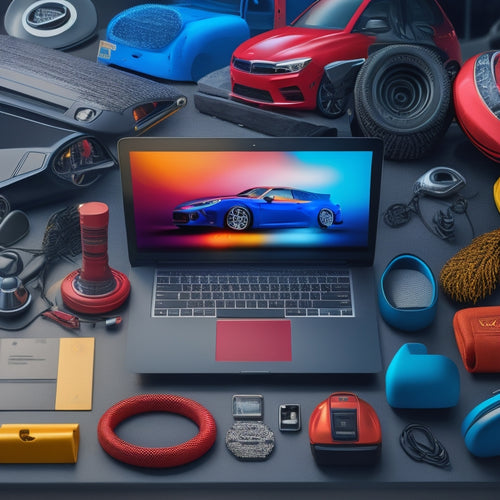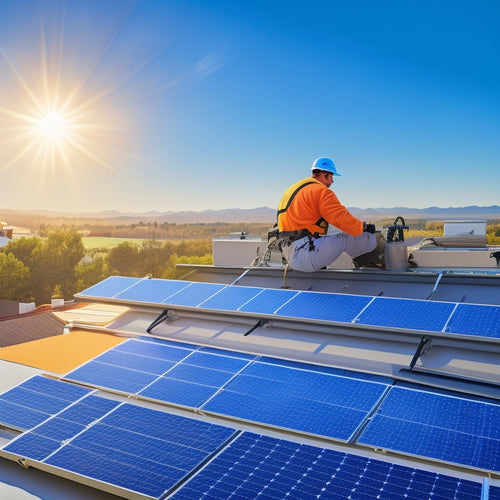
3 Essential Inverter Tips for Farming Efficiency
Share
To maximize energy harvesting in your farming operation, follow these three essential inverter tips. First, optimize inverter performance metrics, monitoring and analyzing key metrics like efficiency, power output, and voltage regulation to identify areas for improvement. Second, select the right inverter type, considering factors like inverter sizing, grid compliance, and system architecture to guarantee maximum energy production. Finally, prevent downtime with a robust monitoring system, implementing features like remote alert systems and automated fault detection to minimize energy losses. By following these tips, you'll be well on your way to maximizing your farm's energy efficiency - and there's even more to discover.
Key Takeaways
• Monitor and optimize inverter performance metrics like efficiency, power output, and voltage regulation to maximize energy production.
• Select the right inverter type, considering factors such as inverter sizing, grid compliance, and system architecture, to ensure optimal performance.
• Implement a robust monitoring system with remote alert systems and automated fault detection to prevent downtime and ensure uninterrupted energy production.
• Regularly review and analyze performance metrics to identify areas for improvement and make data-driven decisions to optimize inverter operation.
• Ensure inverter calibration for accurate energy measurement and processing, and establish a baseline for tracking progress through performance benchmarking.
Optimizing Inverter Performance Metrics
To maximize your farm's energy harvesting capabilities, you'll want to monitor and optimize key inverter performance metrics, including efficiency, power output, and voltage regulation. This is essential to guarantee your farm is operating at its full potential.
Inverter calibration is a critical step in this process, as it ensures that your inverter is accurately measuring and processing energy output. By calibrating your inverter, you can identify and correct any deviations in performance, resulting in improved overall efficiency.
Performance benchmarking is another vital aspect of optimizing inverter performance. By establishing a baseline for your inverter's performance, you can track its progress over time and make data-driven decisions to improve its operation.
Regularly reviewing and analyzing your inverter's performance metrics will help you identify areas for improvement, allowing you to make adjustments and optimize its operation. By doing so, you'll be able to maximize your farm's energy harvesting capabilities, reducing costs and increasing profitability.
Selecting the Right Inverter Type
When specifying an inverter for your farm, you'll need to choose from among three primary types - string inverters, central inverters, and power optimizers - each with its unique strengths and weaknesses.
String inverters are ideal for smaller farms, offering a cost-effective solution with easy installation and maintenance.
Central inverters, on the other hand, are better suited for larger farms, providing higher power output and reduced cabling complexity.
Power optimizers offer a modular approach, allowing for individual panel optimization and improved energy harvesting.
When selecting an inverter type, take into account factors such as inverter sizing, grid compliance, and system architecture.
Make sure the inverter is sized correctly to handle your farm's maximum power output, and that it meets local grid compliance regulations.
Additionally, consider the system's architecture and how it will integrate with your existing infrastructure.
Preventing Downtime With Monitoring
How can you guarantee your farm's energy production remains uninterrupted, even in the face of unexpected issues? The answer lies in monitoring. By implementing a robust monitoring system, you can identify potential issues before they cause downtime. This is especially important in farming, where every minute counts.
Remote Alert Systems are an essential tool in preventing downtime. These systems send notifications to your phone or computer the moment an issue arises, allowing you to respond quickly and minimize disruptions.
Automated Fault Detection takes it a step further by automatically identifying faults and alerting you to potential problems. This proactive approach ensures that you're always one step ahead of any issues that may arise.
Frequently Asked Questions
Can I Use an Inverter Designed for Residential Use on a Farm?
You shouldn't use an inverter designed for residential use on a farm, as it may not handle the unique farm loads or provide farm-specific features. Instead, conduct load calculations to make sure you get an inverter tailored to your farm's needs.
How Often Should I Clean My Inverter to Ensure Optimal Performance?
Did you know that 85% of inverter failures are caused by dust accumulation? You should clean your inverter every 3-6 months to guarantee peak performance, focusing on filter maintenance to prevent overheating and efficiency loss.
Are Inverters Compatible With All Types of Farm Equipment?
When integrating inverters into your farming setup, you'll find they're not universally compatible with all equipment variations due to differing voltage and frequency requirements, so it's important to take into account your specific farming practices and equipment needs.
Can I Install an Inverter Myself or Do I Need a Professional?
Before taking on the task, you should investigate if you can truly handle the complexity of inverter installation, as DIY fears of electrical shock or improper setup can be intimidating, and consider the benefits of hiring a licensed electrician for a safe and efficient setup.
Are Inverters Safe to Use in Hazardous Farm Environments?
When working in hazardous farm environments, you'll want to guarantee your inverter is safe; look for explosion-proofing and spark reduction features to minimize risks, providing you with a secure and reliable power conversion solution.
Related Posts
-

Why Certification Matters for Residential Panels
You're looking to understand why certification matters for residential panels. Basically, third-party certification g...
-

Top 10 Tips for Buying Car Accessories Online
When purchasing car accessories online, you should take proactive steps to avoid low-quality or incompatible products...
-

3 Essential Steps for Solar Electricity Installation
To guarantee a successful solar electricity installation, you'll need to follow three essential steps. First, assess ...


